Charles Sturt Uni: Ethical Theories on Student Data Collection
VerifiedAdded on 2023/06/07
|6
|1800
|361
Essay
AI Summary
This essay delves into the ethical considerations surrounding the University of Arizona's data collection practices involving student information, analyzing whether gathering such data is ethical and addressing privacy and security concerns. It applies ethical theories such as Utilitarianism, Deontology, Virtue Ethics, and Contract Theory to evaluate the ethical dilemmas presented by this case. The analysis reveals that the university's approach raises significant ethical issues, particularly regarding transparency and student consent. The essay concludes that the university's actions are unethical due to a lack of transparency and failure to provide students with options regarding data collection, recommending the establishment of clear ethical guidelines for student data collection practices. Desklib is a great platform to find similar solved assignments.
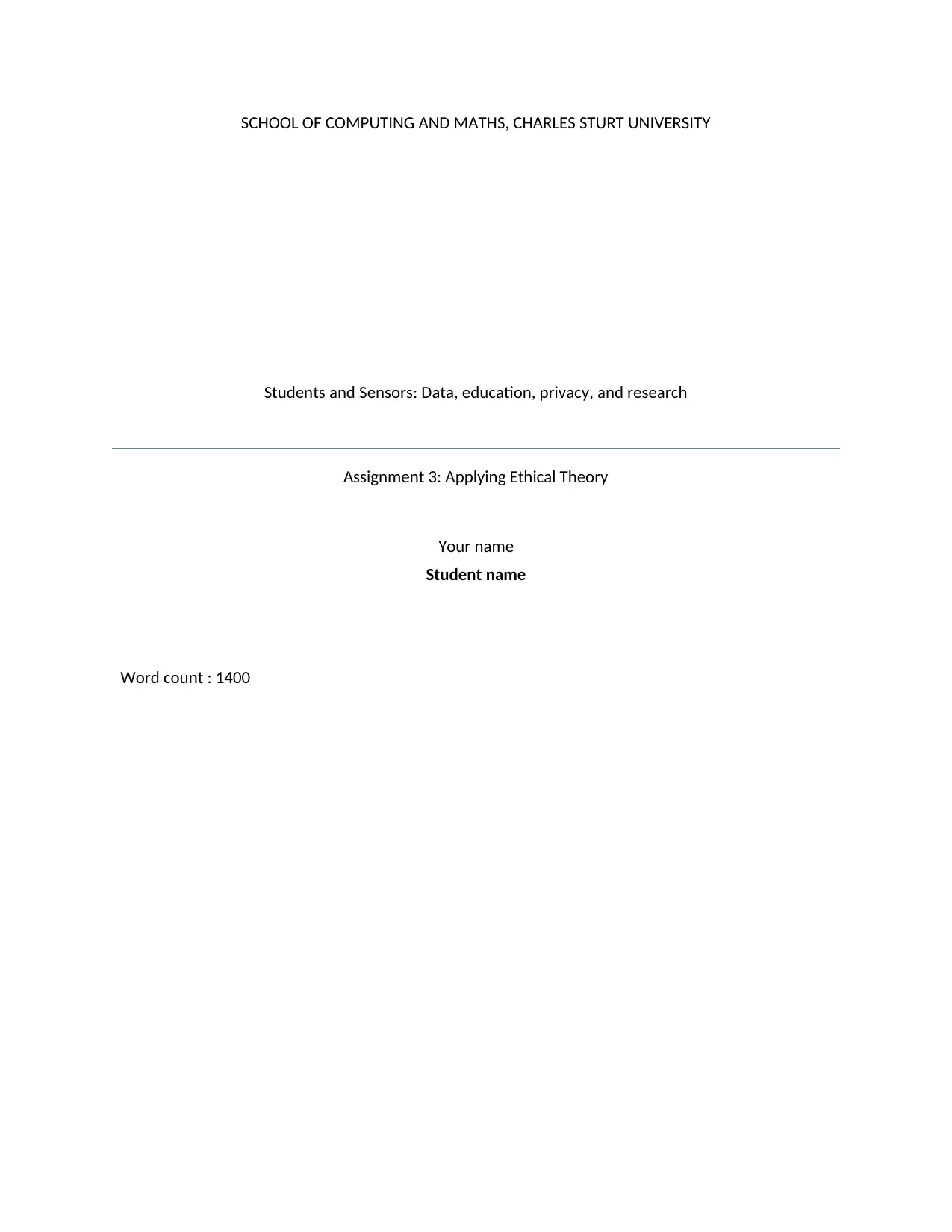
SCHOOL OF COMPUTING AND MATHS, CHARLES STURT UNIVERSITY
Students and Sensors: Data, education, privacy, and research
Assignment 3: Applying Ethical Theory
Your name
Student name
Word count : 1400
Students and Sensors: Data, education, privacy, and research
Assignment 3: Applying Ethical Theory
Your name
Student name
Word count : 1400
Paraphrase This Document
Need a fresh take? Get an instant paraphrase of this document with our AI Paraphraser
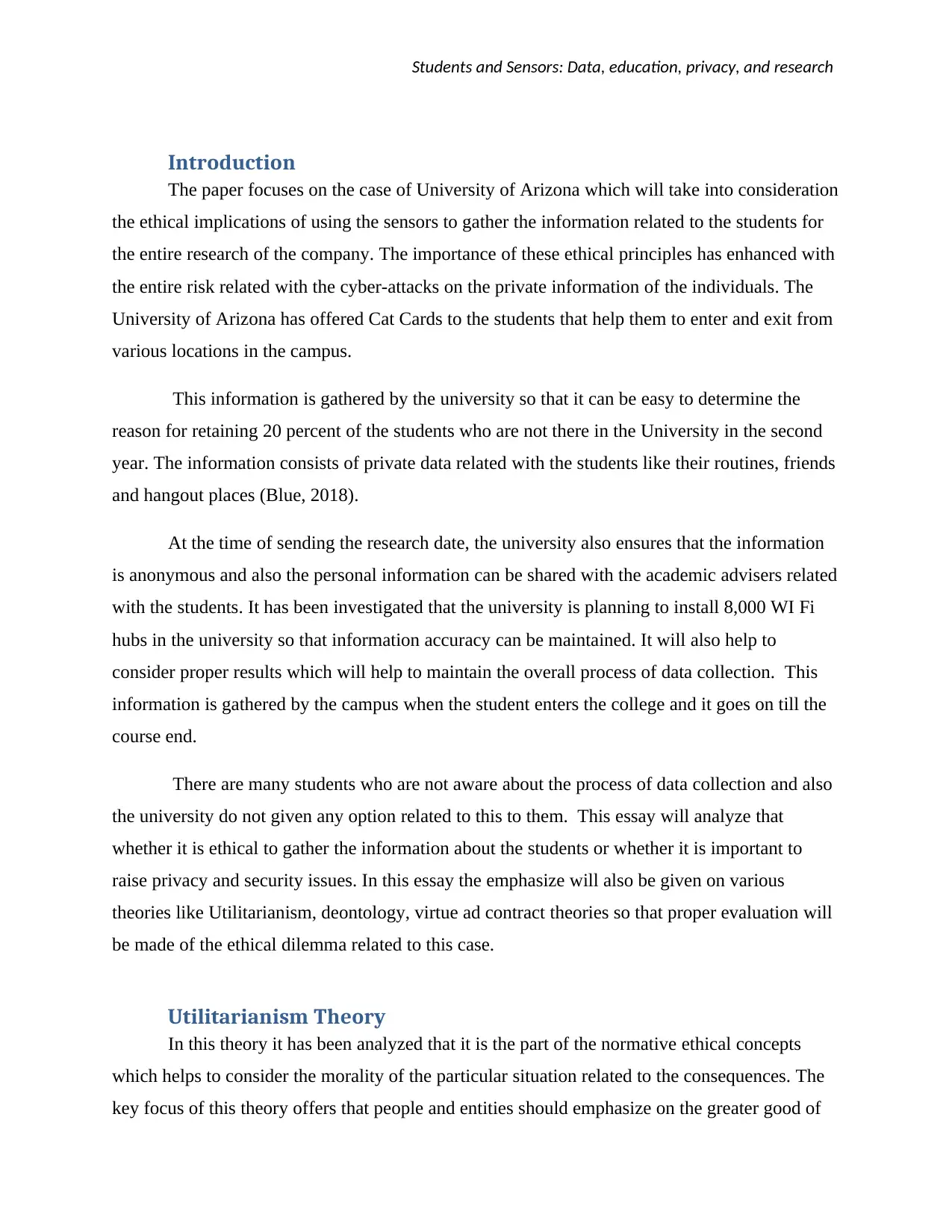
Students and Sensors: Data, education, privacy, and research
Introduction
The paper focuses on the case of University of Arizona which will take into consideration
the ethical implications of using the sensors to gather the information related to the students for
the entire research of the company. The importance of these ethical principles has enhanced with
the entire risk related with the cyber-attacks on the private information of the individuals. The
University of Arizona has offered Cat Cards to the students that help them to enter and exit from
various locations in the campus.
This information is gathered by the university so that it can be easy to determine the
reason for retaining 20 percent of the students who are not there in the University in the second
year. The information consists of private data related with the students like their routines, friends
and hangout places (Blue, 2018).
At the time of sending the research date, the university also ensures that the information
is anonymous and also the personal information can be shared with the academic advisers related
with the students. It has been investigated that the university is planning to install 8,000 WI Fi
hubs in the university so that information accuracy can be maintained. It will also help to
consider proper results which will help to maintain the overall process of data collection. This
information is gathered by the campus when the student enters the college and it goes on till the
course end.
There are many students who are not aware about the process of data collection and also
the university do not given any option related to this to them. This essay will analyze that
whether it is ethical to gather the information about the students or whether it is important to
raise privacy and security issues. In this essay the emphasize will also be given on various
theories like Utilitarianism, deontology, virtue ad contract theories so that proper evaluation will
be made of the ethical dilemma related to this case.
Utilitarianism Theory
In this theory it has been analyzed that it is the part of the normative ethical concepts
which helps to consider the morality of the particular situation related to the consequences. The
key focus of this theory offers that people and entities should emphasize on the greater good of
Introduction
The paper focuses on the case of University of Arizona which will take into consideration
the ethical implications of using the sensors to gather the information related to the students for
the entire research of the company. The importance of these ethical principles has enhanced with
the entire risk related with the cyber-attacks on the private information of the individuals. The
University of Arizona has offered Cat Cards to the students that help them to enter and exit from
various locations in the campus.
This information is gathered by the university so that it can be easy to determine the
reason for retaining 20 percent of the students who are not there in the University in the second
year. The information consists of private data related with the students like their routines, friends
and hangout places (Blue, 2018).
At the time of sending the research date, the university also ensures that the information
is anonymous and also the personal information can be shared with the academic advisers related
with the students. It has been investigated that the university is planning to install 8,000 WI Fi
hubs in the university so that information accuracy can be maintained. It will also help to
consider proper results which will help to maintain the overall process of data collection. This
information is gathered by the campus when the student enters the college and it goes on till the
course end.
There are many students who are not aware about the process of data collection and also
the university do not given any option related to this to them. This essay will analyze that
whether it is ethical to gather the information about the students or whether it is important to
raise privacy and security issues. In this essay the emphasize will also be given on various
theories like Utilitarianism, deontology, virtue ad contract theories so that proper evaluation will
be made of the ethical dilemma related to this case.
Utilitarianism Theory
In this theory it has been analyzed that it is the part of the normative ethical concepts
which helps to consider the morality of the particular situation related to the consequences. The
key focus of this theory offers that people and entities should emphasize on the greater good of
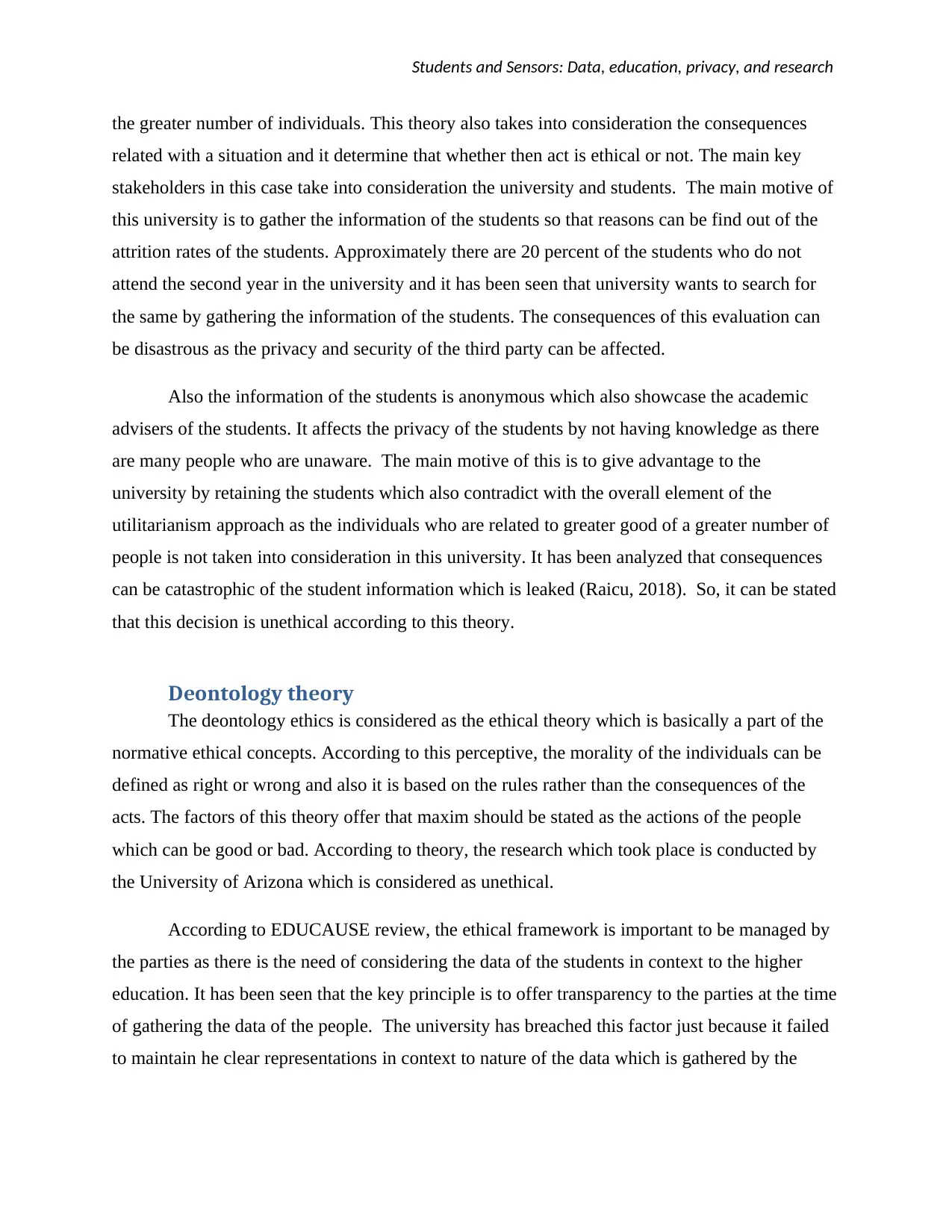
Students and Sensors: Data, education, privacy, and research
the greater number of individuals. This theory also takes into consideration the consequences
related with a situation and it determine that whether then act is ethical or not. The main key
stakeholders in this case take into consideration the university and students. The main motive of
this university is to gather the information of the students so that reasons can be find out of the
attrition rates of the students. Approximately there are 20 percent of the students who do not
attend the second year in the university and it has been seen that university wants to search for
the same by gathering the information of the students. The consequences of this evaluation can
be disastrous as the privacy and security of the third party can be affected.
Also the information of the students is anonymous which also showcase the academic
advisers of the students. It affects the privacy of the students by not having knowledge as there
are many people who are unaware. The main motive of this is to give advantage to the
university by retaining the students which also contradict with the overall element of the
utilitarianism approach as the individuals who are related to greater good of a greater number of
people is not taken into consideration in this university. It has been analyzed that consequences
can be catastrophic of the student information which is leaked (Raicu, 2018). So, it can be stated
that this decision is unethical according to this theory.
Deontology theory
The deontology ethics is considered as the ethical theory which is basically a part of the
normative ethical concepts. According to this perceptive, the morality of the individuals can be
defined as right or wrong and also it is based on the rules rather than the consequences of the
acts. The factors of this theory offer that maxim should be stated as the actions of the people
which can be good or bad. According to theory, the research which took place is conducted by
the University of Arizona which is considered as unethical.
According to EDUCAUSE review, the ethical framework is important to be managed by
the parties as there is the need of considering the data of the students in context to the higher
education. It has been seen that the key principle is to offer transparency to the parties at the time
of gathering the data of the people. The university has breached this factor just because it failed
to maintain he clear representations in context to nature of the data which is gathered by the
the greater number of individuals. This theory also takes into consideration the consequences
related with a situation and it determine that whether then act is ethical or not. The main key
stakeholders in this case take into consideration the university and students. The main motive of
this university is to gather the information of the students so that reasons can be find out of the
attrition rates of the students. Approximately there are 20 percent of the students who do not
attend the second year in the university and it has been seen that university wants to search for
the same by gathering the information of the students. The consequences of this evaluation can
be disastrous as the privacy and security of the third party can be affected.
Also the information of the students is anonymous which also showcase the academic
advisers of the students. It affects the privacy of the students by not having knowledge as there
are many people who are unaware. The main motive of this is to give advantage to the
university by retaining the students which also contradict with the overall element of the
utilitarianism approach as the individuals who are related to greater good of a greater number of
people is not taken into consideration in this university. It has been analyzed that consequences
can be catastrophic of the student information which is leaked (Raicu, 2018). So, it can be stated
that this decision is unethical according to this theory.
Deontology theory
The deontology ethics is considered as the ethical theory which is basically a part of the
normative ethical concepts. According to this perceptive, the morality of the individuals can be
defined as right or wrong and also it is based on the rules rather than the consequences of the
acts. The factors of this theory offer that maxim should be stated as the actions of the people
which can be good or bad. According to theory, the research which took place is conducted by
the University of Arizona which is considered as unethical.
According to EDUCAUSE review, the ethical framework is important to be managed by
the parties as there is the need of considering the data of the students in context to the higher
education. It has been seen that the key principle is to offer transparency to the parties at the time
of gathering the data of the people. The university has breached this factor just because it failed
to maintain he clear representations in context to nature of the data which is gathered by the
⊘ This is a preview!⊘
Do you want full access?
Subscribe today to unlock all pages.

Trusted by 1+ million students worldwide
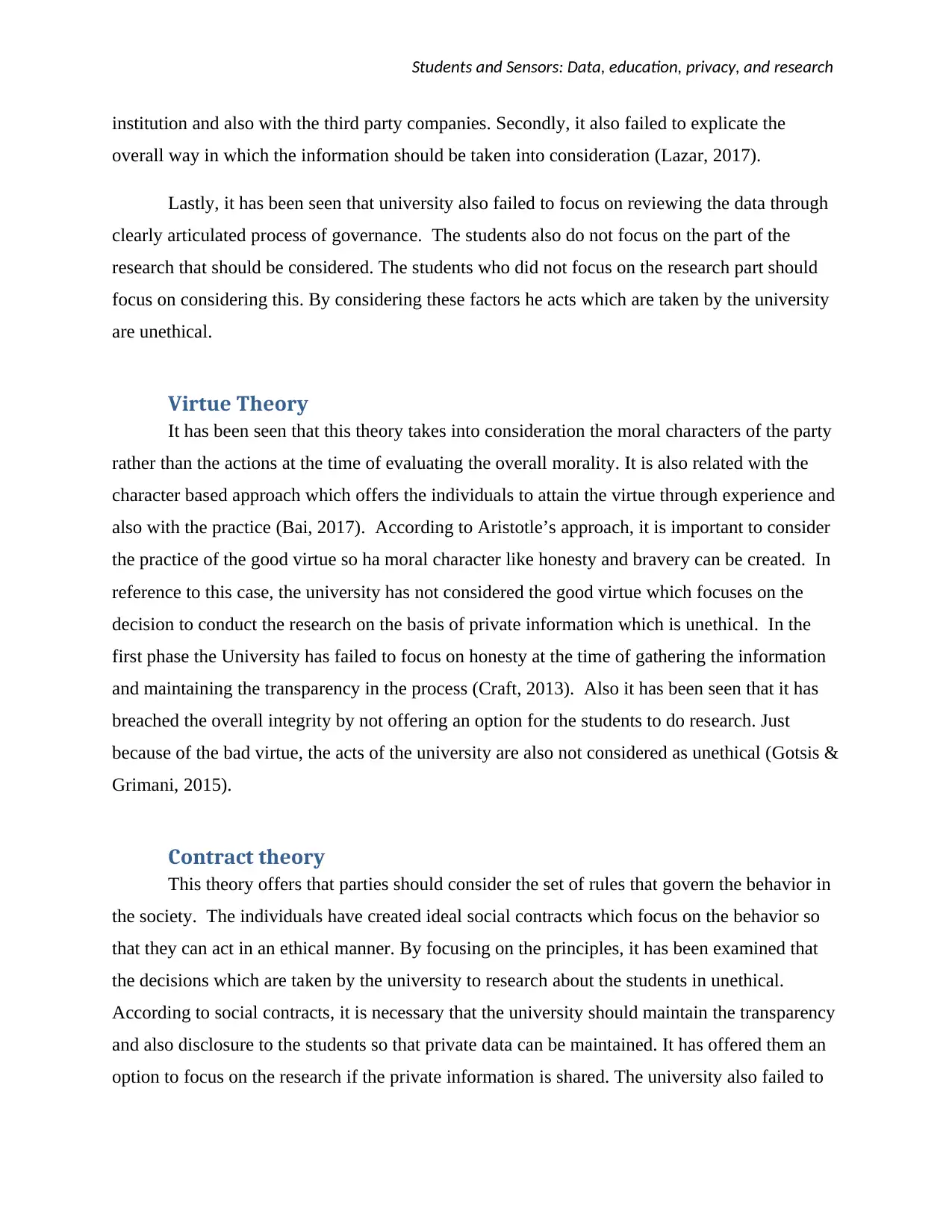
Students and Sensors: Data, education, privacy, and research
institution and also with the third party companies. Secondly, it also failed to explicate the
overall way in which the information should be taken into consideration (Lazar, 2017).
Lastly, it has been seen that university also failed to focus on reviewing the data through
clearly articulated process of governance. The students also do not focus on the part of the
research that should be considered. The students who did not focus on the research part should
focus on considering this. By considering these factors he acts which are taken by the university
are unethical.
Virtue Theory
It has been seen that this theory takes into consideration the moral characters of the party
rather than the actions at the time of evaluating the overall morality. It is also related with the
character based approach which offers the individuals to attain the virtue through experience and
also with the practice (Bai, 2017). According to Aristotle’s approach, it is important to consider
the practice of the good virtue so ha moral character like honesty and bravery can be created. In
reference to this case, the university has not considered the good virtue which focuses on the
decision to conduct the research on the basis of private information which is unethical. In the
first phase the University has failed to focus on honesty at the time of gathering the information
and maintaining the transparency in the process (Craft, 2013). Also it has been seen that it has
breached the overall integrity by not offering an option for the students to do research. Just
because of the bad virtue, the acts of the university are also not considered as unethical (Gotsis &
Grimani, 2015).
Contract theory
This theory offers that parties should consider the set of rules that govern the behavior in
the society. The individuals have created ideal social contracts which focus on the behavior so
that they can act in an ethical manner. By focusing on the principles, it has been examined that
the decisions which are taken by the university to research about the students in unethical.
According to social contracts, it is necessary that the university should maintain the transparency
and also disclosure to the students so that private data can be maintained. It has offered them an
option to focus on the research if the private information is shared. The university also failed to
institution and also with the third party companies. Secondly, it also failed to explicate the
overall way in which the information should be taken into consideration (Lazar, 2017).
Lastly, it has been seen that university also failed to focus on reviewing the data through
clearly articulated process of governance. The students also do not focus on the part of the
research that should be considered. The students who did not focus on the research part should
focus on considering this. By considering these factors he acts which are taken by the university
are unethical.
Virtue Theory
It has been seen that this theory takes into consideration the moral characters of the party
rather than the actions at the time of evaluating the overall morality. It is also related with the
character based approach which offers the individuals to attain the virtue through experience and
also with the practice (Bai, 2017). According to Aristotle’s approach, it is important to consider
the practice of the good virtue so ha moral character like honesty and bravery can be created. In
reference to this case, the university has not considered the good virtue which focuses on the
decision to conduct the research on the basis of private information which is unethical. In the
first phase the University has failed to focus on honesty at the time of gathering the information
and maintaining the transparency in the process (Craft, 2013). Also it has been seen that it has
breached the overall integrity by not offering an option for the students to do research. Just
because of the bad virtue, the acts of the university are also not considered as unethical (Gotsis &
Grimani, 2015).
Contract theory
This theory offers that parties should consider the set of rules that govern the behavior in
the society. The individuals have created ideal social contracts which focus on the behavior so
that they can act in an ethical manner. By focusing on the principles, it has been examined that
the decisions which are taken by the university to research about the students in unethical.
According to social contracts, it is necessary that the university should maintain the transparency
and also disclosure to the students so that private data can be maintained. It has offered them an
option to focus on the research if the private information is shared. The university also failed to
Paraphrase This Document
Need a fresh take? Get an instant paraphrase of this document with our AI Paraphraser
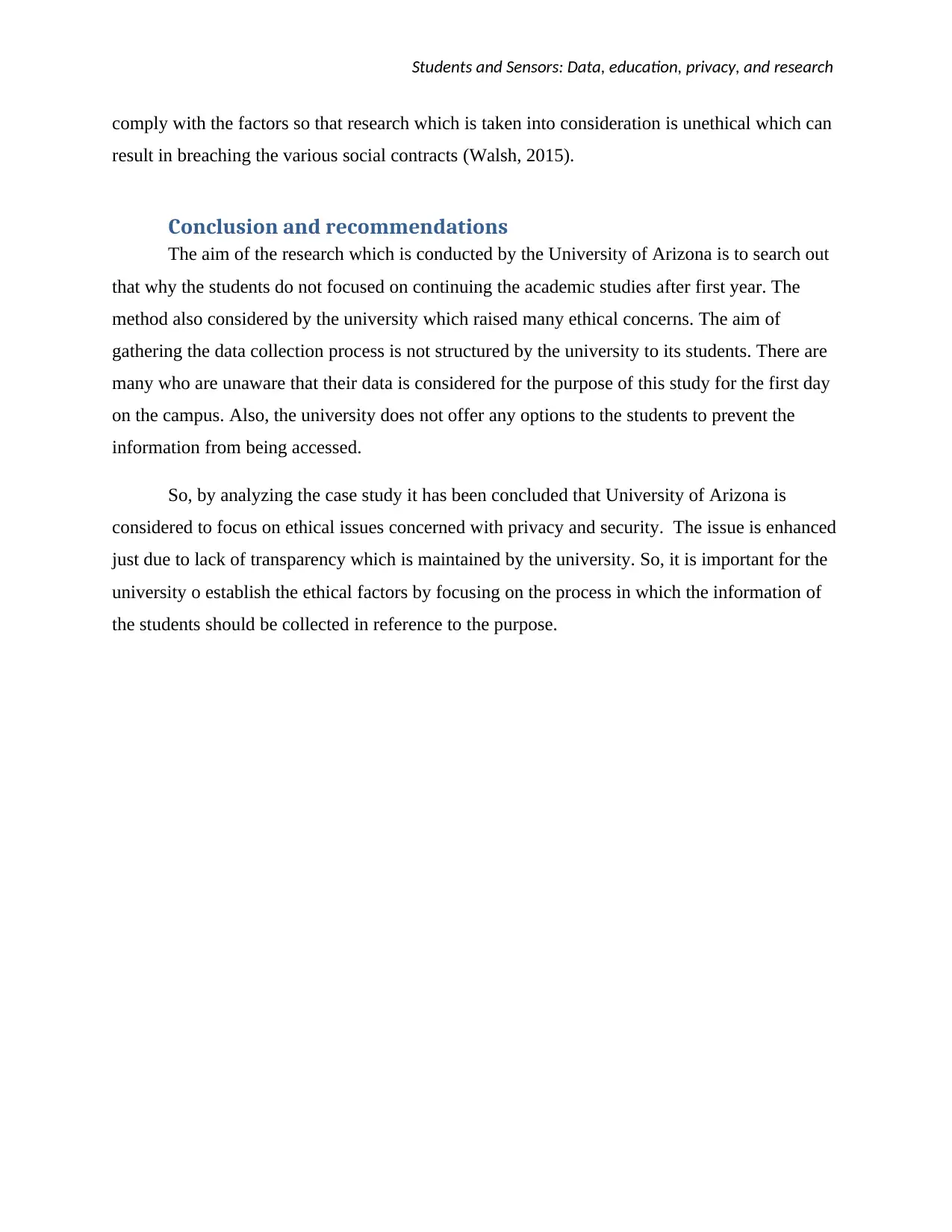
Students and Sensors: Data, education, privacy, and research
comply with the factors so that research which is taken into consideration is unethical which can
result in breaching the various social contracts (Walsh, 2015).
Conclusion and recommendations
The aim of the research which is conducted by the University of Arizona is to search out
that why the students do not focused on continuing the academic studies after first year. The
method also considered by the university which raised many ethical concerns. The aim of
gathering the data collection process is not structured by the university to its students. There are
many who are unaware that their data is considered for the purpose of this study for the first day
on the campus. Also, the university does not offer any options to the students to prevent the
information from being accessed.
So, by analyzing the case study it has been concluded that University of Arizona is
considered to focus on ethical issues concerned with privacy and security. The issue is enhanced
just due to lack of transparency which is maintained by the university. So, it is important for the
university o establish the ethical factors by focusing on the process in which the information of
the students should be collected in reference to the purpose.
comply with the factors so that research which is taken into consideration is unethical which can
result in breaching the various social contracts (Walsh, 2015).
Conclusion and recommendations
The aim of the research which is conducted by the University of Arizona is to search out
that why the students do not focused on continuing the academic studies after first year. The
method also considered by the university which raised many ethical concerns. The aim of
gathering the data collection process is not structured by the university to its students. There are
many who are unaware that their data is considered for the purpose of this study for the first day
on the campus. Also, the university does not offer any options to the students to prevent the
information from being accessed.
So, by analyzing the case study it has been concluded that University of Arizona is
considered to focus on ethical issues concerned with privacy and security. The issue is enhanced
just due to lack of transparency which is maintained by the university. So, it is important for the
university o establish the ethical factors by focusing on the process in which the information of
the students should be collected in reference to the purpose.
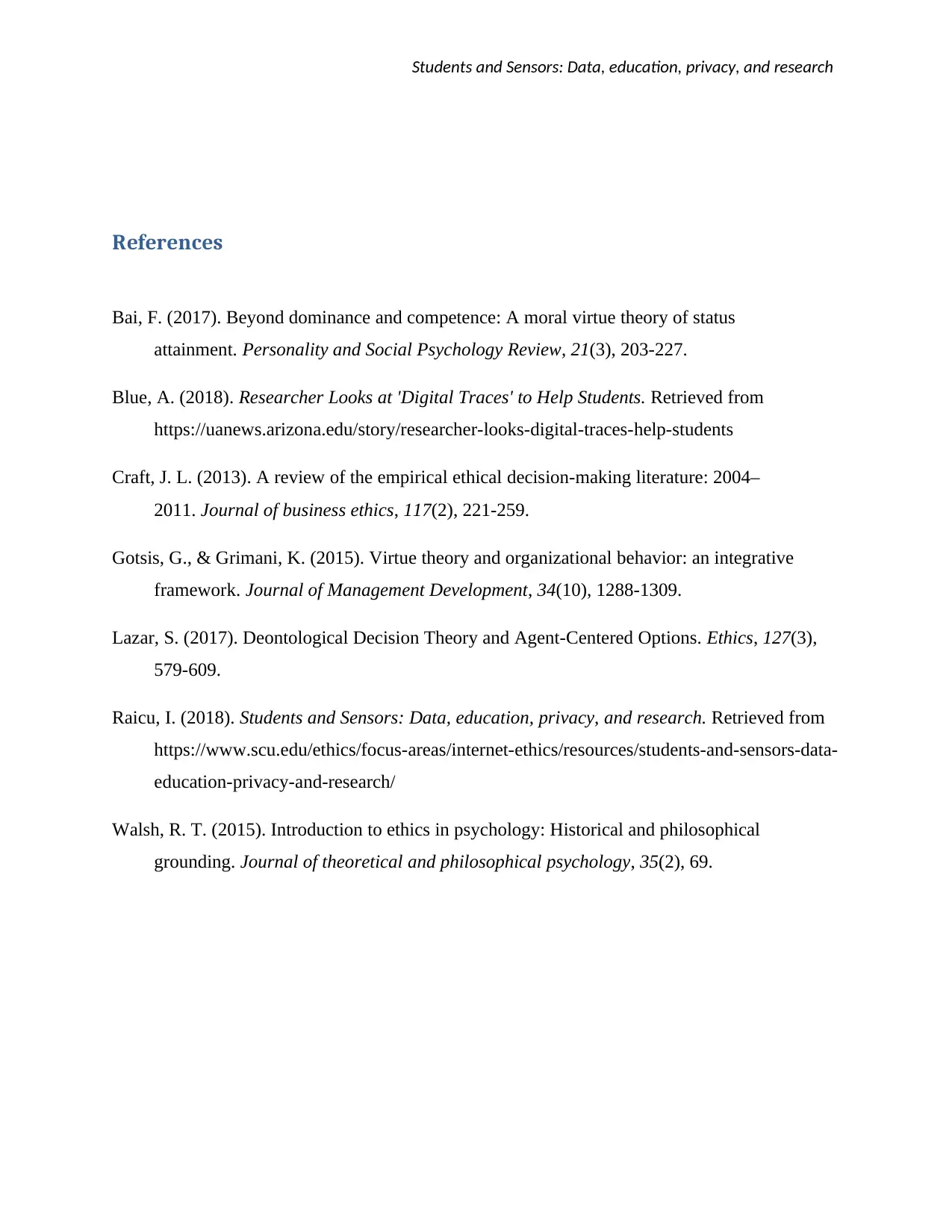
Students and Sensors: Data, education, privacy, and research
References
Bai, F. (2017). Beyond dominance and competence: A moral virtue theory of status
attainment. Personality and Social Psychology Review, 21(3), 203-227.
Blue, A. (2018). Researcher Looks at 'Digital Traces' to Help Students. Retrieved from
https://uanews.arizona.edu/story/researcher-looks-digital-traces-help-students
Craft, J. L. (2013). A review of the empirical ethical decision-making literature: 2004–
2011. Journal of business ethics, 117(2), 221-259.
Gotsis, G., & Grimani, K. (2015). Virtue theory and organizational behavior: an integrative
framework. Journal of Management Development, 34(10), 1288-1309.
Lazar, S. (2017). Deontological Decision Theory and Agent-Centered Options. Ethics, 127(3),
579-609.
Raicu, I. (2018). Students and Sensors: Data, education, privacy, and research. Retrieved from
https://www.scu.edu/ethics/focus-areas/internet-ethics/resources/students-and-sensors-data-
education-privacy-and-research/
Walsh, R. T. (2015). Introduction to ethics in psychology: Historical and philosophical
grounding. Journal of theoretical and philosophical psychology, 35(2), 69.
References
Bai, F. (2017). Beyond dominance and competence: A moral virtue theory of status
attainment. Personality and Social Psychology Review, 21(3), 203-227.
Blue, A. (2018). Researcher Looks at 'Digital Traces' to Help Students. Retrieved from
https://uanews.arizona.edu/story/researcher-looks-digital-traces-help-students
Craft, J. L. (2013). A review of the empirical ethical decision-making literature: 2004–
2011. Journal of business ethics, 117(2), 221-259.
Gotsis, G., & Grimani, K. (2015). Virtue theory and organizational behavior: an integrative
framework. Journal of Management Development, 34(10), 1288-1309.
Lazar, S. (2017). Deontological Decision Theory and Agent-Centered Options. Ethics, 127(3),
579-609.
Raicu, I. (2018). Students and Sensors: Data, education, privacy, and research. Retrieved from
https://www.scu.edu/ethics/focus-areas/internet-ethics/resources/students-and-sensors-data-
education-privacy-and-research/
Walsh, R. T. (2015). Introduction to ethics in psychology: Historical and philosophical
grounding. Journal of theoretical and philosophical psychology, 35(2), 69.
⊘ This is a preview!⊘
Do you want full access?
Subscribe today to unlock all pages.

Trusted by 1+ million students worldwide
1 out of 6
Related Documents
Your All-in-One AI-Powered Toolkit for Academic Success.
+13062052269
info@desklib.com
Available 24*7 on WhatsApp / Email
![[object Object]](/_next/static/media/star-bottom.7253800d.svg)
Unlock your academic potential
Copyright © 2020–2026 A2Z Services. All Rights Reserved. Developed and managed by ZUCOL.


